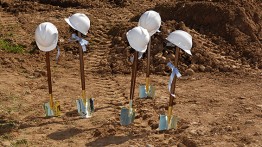Pluriversal, Bewildered and Otherwise | On Loss: Sacrificial Rites of Architecture, Nicholas Korody and Joanna Joseph
Tuesday, April 5, 2022, 12 - 2pm

This lecture will be conducted through Zoom only. Zoom account registration is required, please register in advance here.
At any given moment, somewhere in the world a building is “breaking ground,” formally setting off a chain of events that will entail the continuous mobilization of materials, labor, and capital for several years, decades, or even centuries. While many “groundbreakings” go unnoticed and unheralded, for certain buildings the occasion is marked. Typically adhering to a prescribed script and set of props, they feature rehearsed speeches and requisite laudations, while the various actors in the development pose for photographs with gold-plated, often comically oversized building equipment to be later mounted on walnut and hung on an office wall. Somewhere between the grotesque and the infantile, hyperbolic scale is deployed alongside surface sheen in a crude theatrics of neoliberal optimism and its ideology of growth. Otherwise obscured by the secular posturing of finance capital and the banality of corporate aesthetics, groundbreakings remain ceremonial rites, shaped and haunted by a long history of occult practices that once accompanied building construction. Far from simply a celebration of the “new,” these rituals were intended to address a fundamental and irreparable loss that accompanies every act of building. Often involving a sacrifice––sometimes human––groundbreakings established an exchange between builders and land, marking construction as a disturbance within an economy of forces and bodies that far exceeds the limits of a site, the scope of expense reports, or the lifespans of its architects. On Loss: Sacrificial Rites of Architecture explores the ritualized foundations of architecture and their translation within the world of corporate finance.
Nicholas Korody is a writer, designer, and researcher from Los Angeles, currently based in Milan. His writing has been featured in publications such as Kaleidoscope, 032c, Pin-Up, Harvard Design Magazine, Metropolis, e-flux Architecture, as well as The Uses of Decorating, a collection of essays translated into Spanish and published in Madrid in 2020. His visual work has been exhibited at various international institutions including Swiss Institute, Triennale di Milano, Musée d'art moderne de la Ville de Paris, V-A-C Zattere, and the Moderna Museet. He holds a Masters of Science in Critical, Conceptual, and Curatorial Practices from Columbia University and currently teaches at Design Academy Eindhoven. He is the managing editor of Capsule, cofounder of Adjustments Agency, and founder of Interiors Agency.
Joanna Joseph is an editor, educator, and writer based in Brooklyn. She is an Assistant Adjunct Professor at Columbia University’s Graduate School of Architecture, Planning and Preservation, the Associate Editor at Columbia University Books on Architecture and the City, as well as a Contributing Editor at the Avery Review. She is a co-founder of the architectural research practice Adjustments Agency with Nicholas Korody. Her writing has appeared in Spike Art Magazine, Harvard Design Magazine, Real Review, and elsewhere, and she has exhibited at various institutions including the Milan Architecture Triennale, the Swiss Institute, and the Architecture and Design Museum. She holds an M.S. in Critical, Curatorial and Conceptual Practices from Columbia University.
This event is accessible to the public through Zoom.
Located at 7 East 7th Street, between Third and Fourth Avenues




